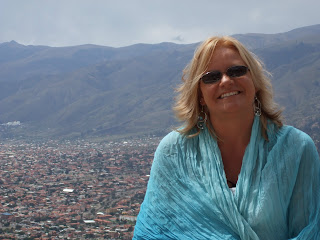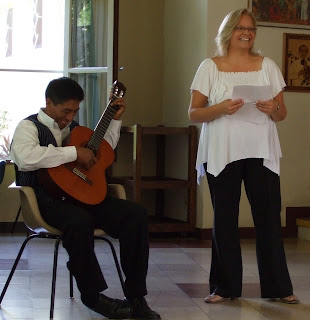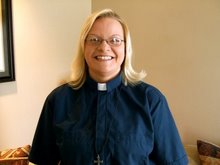 Greetings and peace, family, friends and supporters!
Greetings and peace, family, friends and supporters!The view from Cristo Rey de Concordia (the statue of Jesus that overlooks the city) is spectacular and it is difficult to believe, in fact, that it is December!!
A thirty foot Christmas tree greeted shoppers a couple of weeks ago at one of the markets here in Cochabamba. The tree surprised me and in that instant I thought, "it's summer, what's going on here?!" In reality, of course, it was mid-November and the natural time for stores and markets to bring our focus to the upcoming Christmas season. But for me, these last few months have felt like a perpetual summer, even as I have heard from family and friends back in Canada about snowstorms and dropping temperatures. The climate at this time of the year is drastically different here. Spring is more like summer: most days are sunny, sometimes rain, lots of wind later in the day. Temperatures are in the mid 20's still, summer this year has lasted five months so far...
But this perpetual summer has me pondering other realities that seem to be "perpetual" in this culture and in many other places around the world. For instance: violence, poverty, racism, sexism, to name a few. The other night I attended a presentation about violence in Bolivia and, in particular, the violence in Pando just this past September. Documentaries have been made using some of the live footage as the events unfolded between the state government and campasinos. Violence erupted quickly, many were injured within the first fifteen minutes, and about a half an hour later, thirty campasinos were murdered. The video footage is harsh, difficult to walk. The room is silent, but not for long. Many questions are raised, many are left in my mind, even now. The prefector was charged with the murders, but he is also an opponent of Evo Morales, the President of Bolivia. One wonders if this is coincidence, who really ordered the murders, who started the conflict....more profound questions resulted after the presentation. What is justice? Is violence necessary? And if so, why? Why does there have to be such a large gap between rich and poor...why do people suffer? More provocative....what is our role to be as Christians? What does God call us to do...how are we to respond? Do we need to change our lifestyle choices so that others in the world can live with dignity, earn a decent living, provide for their families and have enough food to eat. Are people not entitled to the land that is their ancestral home? It seems to me, yes, of course, but that also means that descendants of colonization will have to give up territory they have claimed as their own. The issues are not so different from issues we face in Canada with our indigenous people. Only here, the government and infrastucture is still in a process of decolonization and its impact is intense.
 The Bolivian culture and identity is strong, it is beautiful and it is unique. Years of Spanish colonization has created an interesting mix now, some five hundred years later, however, the recovery from the conquest and the struggle to find an independent identity has not been an easy path. Other governments' interruption of the process has complicated matters: issues with coca growing, drug trafficking, region tensions, the poor becoming more poor, the rights of the indigenous, for example, all have an impact on this process of decolonization. Some of these issues here feel "perpetual" for those who are working for a just and equitable society.
The Bolivian culture and identity is strong, it is beautiful and it is unique. Years of Spanish colonization has created an interesting mix now, some five hundred years later, however, the recovery from the conquest and the struggle to find an independent identity has not been an easy path. Other governments' interruption of the process has complicated matters: issues with coca growing, drug trafficking, region tensions, the poor becoming more poor, the rights of the indigenous, for example, all have an impact on this process of decolonization. Some of these issues here feel "perpetual" for those who are working for a just and equitable society.  As part of my good-bye speech at the Institute (we all give a speech at the end of our course), I sang a Spanish song whose message is, simply translated, "the answer is the love of God". The love of God is the answers to all the questions, and how true this is! God's love is what gives us the power, the courage, the strength, the will to live, the desire to love others and hearts to work for justice, peace and the rights of all humans in the world. We love, we give because we have first received these gifts of grace, forgiveness and eternal life. The waters of our baptism affirm the promises of God and from those waters flow our actions and our choices. A friend recently asked me what I am willing to give up in a specific situation... but that question lingered into other areas of life. What have I given up already....my apartment, my car, most of my belongings, my country, everyone I have known and loved...you mean I need to give up more? And in all seriousness, yes, the answer is yes...I, we, need to give up more of ourselves out of love for our neighbour. We always have the potential to replace all our belongings, we have good health care, good educational opportunities, we can begin again, buy anything we need, pretty much. But what are those choices that we can make for the love of our neighbour, how can we heighten our awareness of global issues and realities, so that our choices reflect God's love for us.... so that we can give from what we have so that the mother of three who begs me for food can actually provide food for her family each day....so that campasinos do not need to protest and die to keep their land, land that is originally theirs before colonists came and exploited the people and the land, then left.
As part of my good-bye speech at the Institute (we all give a speech at the end of our course), I sang a Spanish song whose message is, simply translated, "the answer is the love of God". The love of God is the answers to all the questions, and how true this is! God's love is what gives us the power, the courage, the strength, the will to live, the desire to love others and hearts to work for justice, peace and the rights of all humans in the world. We love, we give because we have first received these gifts of grace, forgiveness and eternal life. The waters of our baptism affirm the promises of God and from those waters flow our actions and our choices. A friend recently asked me what I am willing to give up in a specific situation... but that question lingered into other areas of life. What have I given up already....my apartment, my car, most of my belongings, my country, everyone I have known and loved...you mean I need to give up more? And in all seriousness, yes, the answer is yes...I, we, need to give up more of ourselves out of love for our neighbour. We always have the potential to replace all our belongings, we have good health care, good educational opportunities, we can begin again, buy anything we need, pretty much. But what are those choices that we can make for the love of our neighbour, how can we heighten our awareness of global issues and realities, so that our choices reflect God's love for us.... so that we can give from what we have so that the mother of three who begs me for food can actually provide food for her family each day....so that campasinos do not need to protest and die to keep their land, land that is originally theirs before colonists came and exploited the people and the land, then left. And so, questions linger in this perpetual summer, but we know that we are held in God's love as we struggle with these issues and our responsibilities and choices in the midst of the questions.

“Who will separate us from the love of Christ? Will hardship, or distress, or persecution, or famine, or nakedness, or peril, or sword? As it is written, ‘For your sake we are being killed all day long; we are accounted as sheep to be slaughtered.’ No, in all these things we are more than conquerors through him who loved us. For I am convinced that neither death, nor life, nor angels, nor rulers, nor things present, nor things to come, nor powers, nor height, nor depth, nor anything else in all creation, will be able to separate us from the love of God in Christ Jesus our Lord.” Romans 8: 35-39.
Peace, blessings, and the grace of God!
Fran.
La misma en castellano:
Ví un arbol de navidad el otro día en el supermercado. Fue una sorpresa para mi, porque lo que me haces sentir como en verano en Canada. Pero, no es así, estabamos amitad de Noviembre. Entonces, este tiempo es un verano eterno aquí en Cochabamba. Esta realidad, me hace pensar en otras eternas en otros paises. Por ejemplo: la violencia, el crime, la pobresa, el racismo, y el discriminación de genero.
El otro día, fue a una charla sobre la violencia en Bolivia, especialmente la situación en Pando en Septiembre pasado. Miramos en esta charla diferentes partes de dos documentales que mostraron los eventos y los conflictos. El conflicto involucró al gobierno y a los campesinos con el tema de las tierras. Lo que miramos fue sacado con celulares. La violencia paso muy pronto, muchas personas fueron heridas y después de 30 minutos mas o menos, trienta campesinos se muieron. Fue difícil a ver, el cuarto estaba en silencio por dos o tres minutos. Después, hicieron muchas preguntas. El prefecto está en la carcel ahora, accusado de las muertes, pero él es de la oposición de Evo Morales, el Presidente de Bolivia. Estóy pensando si eso es una coincidencia...quien quiere las muertes, la violencia, en este conflicto en realidad. Tengo más preguntas profundas...por ejemplo: ¿qué es justicia, quién decide?...¿la violencia es necesario para cambiar? Y,si es.. ¿porqué? ¿Porqué hay un espacio tan grande entre ricos y pobres? ¿Porqué las personas sufren? Y más provocativo: ¿cuál es nuestra rol cómo cristianos y qué dice Dios? Y ¿cómo nos respondemos? ¿Cuál es la llamada de Dios? Necesitamos cambiar nuestras elecciones de vida para que otros viven con dignidad, tener ganar y tener una vida decente para ellos y sus familias y poder tener comida lo suficiente. La gente no es ajena a su tierra, a su casa ancestral, no? Me parece que sí, por supuesto, pero significa que descendientes de la colonización van a dar la tierra que clamar come de su propiadad. Estes recursos no son diferentes de los recursos tenemos en Canadá con nuestras personas indígenas. Solo aquí, el gobierno y la infrastructura están aún en un processo de descolonización y esta influencia es fuerte. La cultura boliviana y su identidad son fuertes, son bonitas, y son unicas. Años de la colonización Española han creada una mexla interesante ahora, después de 500 años, sin embargo, la recouperación de la conquista y el sufrimiento encuentran una identificación independiente que no ha sido un camino fácil.
Interupciones del proceso por otros gobiernos han complicado las cosas: recursos con el cricimiento de la coca, el tráfico de drogas, tensiones regionales, por ejemplo, todo tiene una influencia en este proceso de descolonización. Algunos recursos aquí se sienten “eternos” para los que están trabajando por la justicia y la sociedad equitativa.
Como una parte de mi discurso de despedida del Instituto, canté una canción en canstellano cuyo mensaje es “la respuesta es el amor de Dios.” El amor de Dios es la respuesta a todas las preguntas, y cuan verdadera es! El amor de Dios es el que nos da el poder, la valencia, la fuerza, y la voluntad para vivir: el deseo de amar a otros y trabajar por la justicia, la paz, y los derechos de los humanos del mundo. Amamos y damos porque hemos recibido primero estos regalos de la gracia, el perdon y la vida eterna. El agua de nuestra bautismo afirma los compromisos de Dios y de esa agua fluye nuestras acciones y elecciones. Recientemente, un amigo me preguntó que quiero dar en una situación specífica...pero esta pregunta se queda en otras partes de mi vida. Que he dada ya...mi apartamento, mi carro, casi todas mis cosas, mi país, todo lo que he conocido y he amado...¿quieres decir que necesito dar mas?
Y en serio sí, la respuesta es sí...yo, nosotros necesitamos dar mas de nuestros mismos, en amor de nuestros vecinos. Siempre tenemos el potencial reemplazar nuestras pertenencias, tenemos buen sistema de salud, buenas oportunidades de educación, es posible comenzar otra vez, y comprar cosas que necesitamos. Pero, ¿cuáles son esas elecciones que podemos hacer por el amor de nuestros vecinos?, ¿cómo podemos enterarnos los recursos globales y las realidades; entonces, nuestros elecciones reflejan el amor de Dios por nosotros? Entonces, podemos dar de lo que tenemos para que la mamá de tres niños que me piden limosna para comida puedan en realidad prover comida a su famiia cada dia. Para que los campesinos no necsitan protestar y morir para cuidar su propia tierra, tierra que es originalmente suya antes de que la colonización llegó y explotó a la gente y la tierra y después se fue.
Entonces, las preguntas se quedan en este verano eterno, pero sabemos que estamos abrazados en el amor de Dios mientras peleemos con estes recursos, nuestras responsabilidades y elecciones en medio de las preguntas.
Romans 8: 35-39
"¿Quién nos podrá separar del amor de Cristo? ¿El sufrimiento, o las dificultades, o la persecución, o el hambre, o la falta de ropa, o el peligro, o la muerte violenta? Como dice la EscrituraÑ "Por causa tuya estamos siempre expuestos a la muerteñ nos tratan como a ovejas llevadas al matadero." Pero en todo esto salimos más que vencedores por medio de aquel que nos amó. Estoy convencido de que nada podrá separarnos del amor de Dios: ni la muerte, ni la vida, ni los ángeles, ni los poderes y fuerzas espirituales, ni lo presente, ni lo futuro, ni lo más alto, noi lo más profundo, ni ninguna otra de las coasas creados por Dios. ¿Nada podrá separarnos del amor que Dios nos ha mostrado en Cristo Jesús nuestro Señor!"
Con paz, bendiciones y la gratia de Dios!
Fran

No comments:
Post a Comment